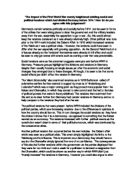The political establishment in Germany succeeded in maintaining political status quo through a policy of moderate reform in the years before WWI. How far do you agree?
Charlotte Phillips
The political establishment in Germany succeeded in maintaining political status quo through a policy of moderate reform. How far do you agree with this judgement?
The political status quo in Germany was successfully maintained by the political establishment to a certain extent due to moderate reform by Von Burlow and Bethmann-Hollweg, however would have not been completely successful without the intervention of nationalist foreign policy which ‘soaked up’ the tension for reform and secured the Burlow Bloc. The success of maintaining the status quo was also marginally down to the lack of unity in the Reichstag, which meant no groups were willing to work together to change the status quo and the constitutional powers held by the Kaiser which meant he held the majority of the power and was never challenged in this period of time. Overall, the most significant reason for the maintenance of the political status quo was moderate reform however; security of this maintenance of the political status quo was due to the other three factors as well.
It is clear that the demand for reform was significant in Germany, which was putting a strain on the power of the Kaiser and ruling elites which meant that in order to maintain the political status quo the chancellors had to grant moderate reform to satisfy the people without giving them enough power to disrupt the status quo. Bismarck dealt with the liberals demand for constitutional reform by attempting to split the party and therefore not having to grant any major reform. He used the issue of war to split the nationally minded liberals from the ones who wanted constitutional reform, then introduced Tariff Law which pleased the national liberals but not the liberal progressives which created a divide in the party which left the demand for constitutional reform an underlying issue. Both Von Burlow and Bethmann-Hollweg dealt with the demand for socialist reform by granting a number of moderate reforms. Between 1899 and 1903 Von Burlow granted an increase in old age pension, increase in accident insurance and sickness insurance which was more generous to the people. In 1911 Bethmann-Hollweg granted imperial insurance to please workers. These reforms were limited and moderate but managed to keep the status quo in place as they kept the fear of rebellion at bay by improving some social issues and successfully preserved the power of the Kaiser by covertly avoiding the demand for constitutional reform. However alone these reforms would have not been enough to maintain the political status quo as methods such as nationalist success acted as a distractions to divert the people’s attention away from moderate nature of the reforms.









